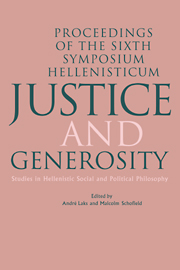 Justice and Generosity
Justice and Generosity Book contents
- Frontmatter
- Contents
- Preface
- Introduction
- PART I POLITICAL PHILOSOPHY: DEVELOPMENT AND TRANSFORMATION
- 1 Polybius' applied political theory
- 2 The statesman and the law in the political philosophy of Cicero
- 3 Aristotelian political theory in the Hellenistic period
- 4 Oikonomia in Hellenistic political thought
- 5 The Cynics and politics
- PART II THE ETHICAL FRAMEWORK OF POLITICS AND SOCIETY
- Bibliography
- General index
- Index of Greek and Latin words
- Index of ancient names and philosophical schools
- Index of passages
2 - The statesman and the law in the political philosophy of Cicero
from PART I - POLITICAL PHILOSOPHY: DEVELOPMENT AND TRANSFORMATION
Published online by Cambridge University Press: 15 October 2009
- Frontmatter
- Contents
- Preface
- Introduction
- PART I POLITICAL PHILOSOPHY: DEVELOPMENT AND TRANSFORMATION
- 1 Polybius' applied political theory
- 2 The statesman and the law in the political philosophy of Cicero
- 3 Aristotelian political theory in the Hellenistic period
- 4 Oikonomia in Hellenistic political thought
- 5 The Cynics and politics
- PART II THE ETHICAL FRAMEWORK OF POLITICS AND SOCIETY
- Bibliography
- General index
- Index of Greek and Latin words
- Index of ancient names and philosophical schools
- Index of passages
Summary
THE DE RE PUBLICA AS A TREATISE DE OPTIMO STATU CIVITATIS AND DE OPTIMO CIVE
The De re publica and the De legibus, both to be dated to the second half of the 50s BC, were regarded by Cicero as complementary in the same way as the Republic and the Laws of Plato: ‘Since you have already written a treatise on the ideal constitution of the commonwealth (de optimo rei publicae statu)’, he makes Atticus say, ‘you should also write one on its laws. For I note that this was done by your beloved Plato’ (Leg. 1.15). The Ciceronian notion of the link between the two Platonic dialogues may seem strange to readers familiar with an evolutionary view of the Platonic corpus, in which the Laws do not complement the Republic, but replace it. But Aristotle already shows a tendency to regard the two Platonic dialogues as forming a whole (Pol. 11.6 1265a2–4); and the thesis of a real complementarity between them has recently been argued afresh. The relationship between the De re publica and the De legibus is none the less quite different from that between the Republic and the Laws. Moving from one Platonic dialogue to the other, one moves from the model of the city to ‘a second politeia’ (Laws v 739d–e), from an uncompromising ideal to a greater concern with the possible, while in Cicero the laws of the De legibus are indeed those of the optimus status of the De re publica (Leg. 11.23; 111.12).
- Type
- Chapter
- Information
- Justice and GenerosityStudies in Hellenistic Social and Political Philosophy - Proceedings of the Sixth Symposium Hellenisticum, pp. 48 - 73Publisher: Cambridge University PressPrint publication year: 1995
- 11
- Cited by


